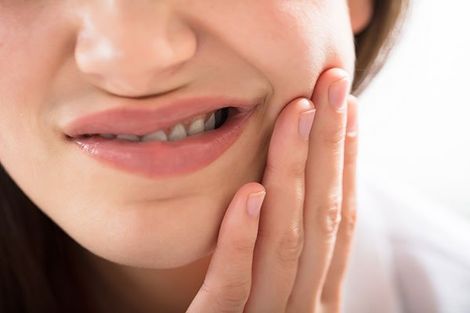The total dental care facility.
TMJ Dentist
TMJ Dental Specialist
We Treat Temporal-Mandibular Joint Disorders
TMJ, also known as the temporal-mandibular joint, is located where the jaw meets your skull. Any TMJ problems you may experience are caused by a misalignment of the teeth, trauma, or excess muscle tension.
Symptoms of Temporal-Mandibular Joint Disorders
- Earaches or Headaches
- Swelling of the Face
- Pressure Behind the Eyes
- Clicking or Popping of the Jaw
- Soreness or Pain in the Face or Jaw Muscles
- Trouble Opening or Closing Your Mouth
- Jaw that Gets Stuck, Locked or Pops Out of Place
- Soreness When Opening or Closing Your Mouth

Simple Home Relief
Whether you are at home, work or on vacation, it may be hard to get into a dentist’s office for immediate relief. John B. Webster DDS
recommends that you switch to soft foods that don’t require a lot of movement in your jaw. Sometimes sticking to a diet like this for a couple of weeks can cause your symptoms to disappear altogether. A soft food diet includes:
- Beans
- Cooked Veggies
- Eggs
- Fish
- Grains
- Mashed Potatoes
- Smoothies
- Soup
- Yogurt
- Beans
- Cooked Veggies
- Eggs
- Fish
- Grains
- Mashed Potatoes
- Smoothies
- Soup
- Yogurt
If this is a reoccurring issue, you can try warm, moist heat to the site of pain for 10 minutes. After try stretching your jaw by placing your left thumb under your upper two front teeth, and placing your right index and middle fingers on the top of your lower front teeth. Using your hands, not your jaw muscles, gently begin to pull the jaw apart.
Our Treatments
John B Webster DDS may treat TMJ issues by replacing missing teeth, moving teeth, adjusting the bite, filling gaps between teeth, etc. A plastic mouthpiece may be helpful in preventing the clenching or grinding of your teeth. If untreated, surgery may be required to repair a severely damaged joint.
BROWSE
OUR WEBSITE
CONTACT
INFORMATION




HOURS OF OPERATION
- Mon - Wed
- -
- Thursday
- -
- Friday
- -
- Sat - Sun
- Closed
Content, including images, displayed on this website is protected by copyright laws. Downloading, republication, retransmission or reproduction of content on this website is strictly prohibited. Terms of Use
| Privacy Policy
